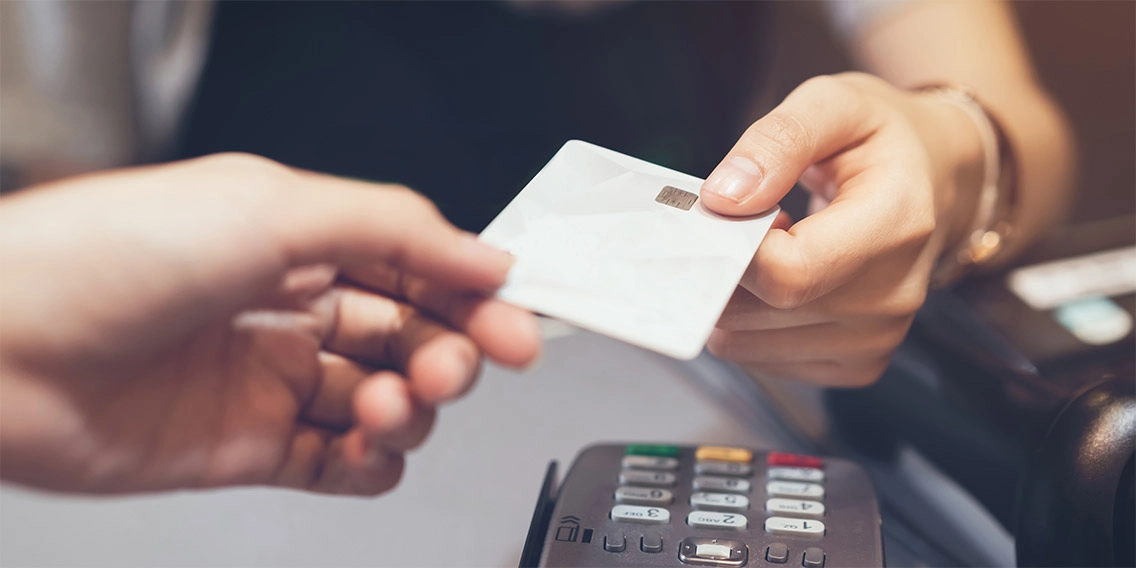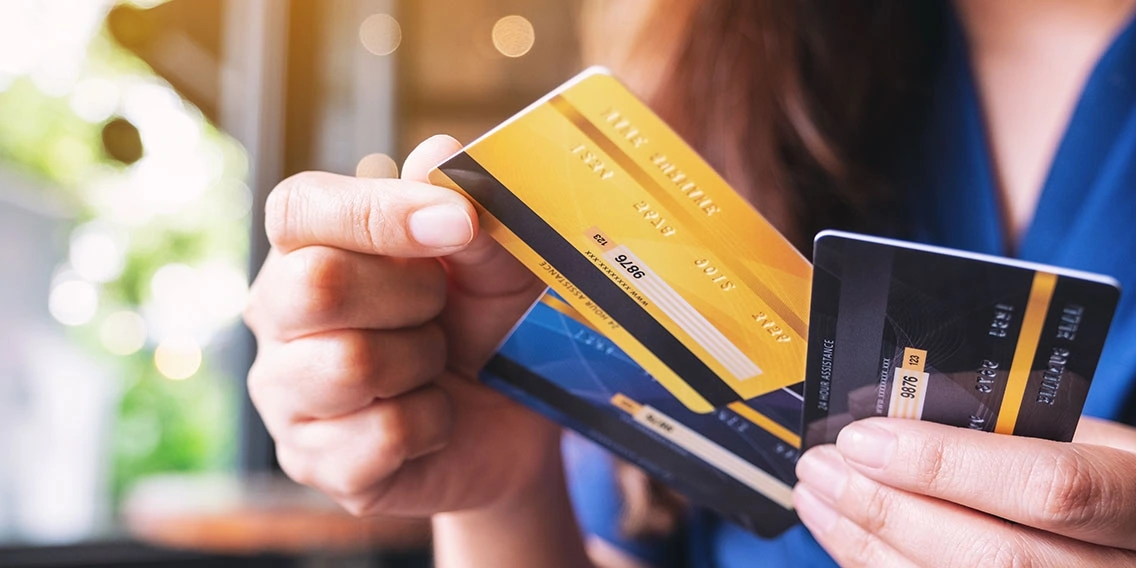CREDIT CARDS
Credit Card Basics: A Beginner's Guide to Credit Cards
EXPECTED READ TIME: 11 MINUTES
A credit card is a powerful financial tool. This video is a beginner’s guide to credit cards. Learn about the basics to credit cards such as credit limits and how to apply. Don't wait, watch now and unlock your credit card journey!
Many Americans tend to use their credit card to buy things they desperately want even if they don't have the cash to cover them.
However, as with many things that offer instant gratification, it comes with a cost.
That's why knowing when, why, and how to use credit can mean the difference between financial freedom and burdensome debt.
Here's your definitive resource for strategically choosing and using a credit card.
What is a Credit Card?
A credit card is a small rectangular piece of plastic that gives you access to a line of credit to borrow money. You can borrow money up to a certain limit, and that money can be used to make purchases and pay bills. Most credit cards also allow you to get cash advances, and many can be used to transfer and consolidate balances from other credit card accounts.
Credit cards can be issued by a credit union, bank, or other financial institution.
When Did Credit Cards Come Out?
Although the concept of credit has been around for centuries, the first credit card is considered to be the Diners Club Card.
Legend has it that in 1949, businessman Frank McNamara forgot his wallet while dining at Major's Cabin Grill in New York City and had to have his wife pay the bill. McNamara returned to the restaurant in February 1950 with his business partner, Ralph Schneider, and this time paid the bill with a small cardboard card that came to be known as the Diners Club Card.
Within a year, Diners Club's membership grew to 10,000 of New York's business elite, with 28 restaurants and two hotels participating. Unlike contemporary credit cards, however, Diners Club balances had to be paid off each month.
A year later, in 1951, Franklin National Bank in Long Island introduced the first card to function like modern cards and be used for general purposes. The Franklin Bank card allowed customers to purchase items and pay them off quickly or roll the debt and pay interest on the charges. Popularity grew, and by 1952, roughly 28,000 customers and 750 businesses signed up for the card.
Today, there are more than 176 million credit card users in the United States, who account for over 39 billion transactions annually. Broken down, that amounts to more than 108.6 million credit card transactions every day.
Types of Credit Cards
On the most basic level, there are two classes of credit cards: secured and unsecured.
Secured credit cards are lines of credit that require you to pay a cash deposit before the card is issued. The deposit, which generally amounts to $200 to $300, protects the card issuer if you don't pay your bill. Younger individuals with no credit and those who've struggled with their credit in the past often find secured credit cards helpful.
On the other hand, unsecured credit cards are a form of revolving credit that allows you to spend up to a certain limit on the account. You can either pay off the balance each month or pay a minimum amount and carry (known as "rolling") the remaining balance to the next month. Interest charges accrue on the rolled balance until the debt is paid in full.
Unsecured credit cards are the most common type of credit card, and the range of options is seemingly endless. That said, unsecured credit cards generally fall into these categories:
Rewards Credit Cards
As the name suggests, rewards cards offer "rewards" for each dollar you spend using the card. Typically, the value of your rewards ranges from 1% to 3% of your purchases. Rewards cards include:
- Points rewards credit cards: This type of card awards points for purchases, such as one point for every dollar you spend. You can then use your points to buy goods and gift cards from different companies.
- Cash back rewards credit cards: These reward cards provide a certain percentage of purchases as cash back that can be applied to your credit card balance, used for future purchases, or even deposited in your bank account.
- Travel rewards credit cards: Structured much like points cards, travel rewards cards allow you to earn "miles" instead of points. The miles you accumulate can then be used to pay for travel-related expenses, such as flights, hotels, vacation packages, cruises, rental cars, and baggage fees.
Balance Transfer Credit Cards
Balance transfer credit cards allow you to transfer credit card debt from other credit cards or lenders. As an incentive, they usually offer a low APR or interest-free rates for a limited time.
Student Credit Cards
Student credit cards are designed for college and graduate students who have little or no credit history. They can be used the same as standard credit cards, but they have lower credit limits and may charge higher interest rates.
Store Credit Cards
Offered directly through retailers, store credit cards let you charge purchases and pay them off over time. Typically, store credit cards can only be used at the specific store that issues them, and they may have higher interest rates than standard cards.
Business Credit Cards
Business credit cards are designed to provide business owners — and, in some cases, employees — access to credit for business-related expenses.
How Many Credit Cards Should I Have?
There's no rule for deciding how many credit cards you should have. Some people may get along just fine without a credit card, while others prefer several cards.
That said, it's a good idea to have at least one credit card, if for no other reason than to build your credit. Using one card responsibly for a variety of purchases and bill payments helps to establish a positive credit history with the three major credit bureaus (Experian, TransUnion, and Equifax).
Your credit history is the most important component of your credit score, so the more payments you make on time, the higher your score. The higher your credit score, the better your chances of qualifying for future loans and getting the best interest rates when you do.
Truth is, your credit score can impact your lifestyle in a variety of ways. It can determine if you're able to rent an apartment and even affect the rate you can get on your cell phone account.
So, if one credit card is good for your credit score, then two is even better, right? Perhaps.
Multiple credit cards can help improve your credit utilization ratio, which also plays a significant role in determining your overall credit score. A low credit utilization ratio generally indicates that you responsibly manage your money since you're not relying heavily on debt. It also means you're more likely to make on-time payments.
Bottom line: Your spending habits and ability to pay your bills should govern how many credit cards you should own.
What Can a Credit Card Be Used For?
Technically, you can use a credit card to purchase or pay for just about anything, as long as it's legal. However, there may be restrictions enforced by your credit card issuer.
Generally, it's best to only charge what you can afford to pay back quickly. Using credit cards this way — basically as an interest-free, short-term loan — allows you to build your credit. It's also the best way to prevent getting into substantial credit card debt.
Here are four types of transactions that make the most sense for credit cards:
Travel Bookings
When booking airfare, hotels, and rental cars, a travel credit card is the preferred method of payment among the respective companies. Credit cards may also offer these advantages over cash or debit cards:
- Free damage insurance for rental vehicles
- Bonus or higher rewards points
- Trip cancellation protection
- Baggage delay insurance
Gas purchases
Credit cards make it easy to pay at the pump, and many cards award extra reward points for doing so. And since gas stations are a common area for card theft, the limited liability that you enjoy if your card number is stolen provides an added incentive for use.
Restaurant Meals
Many rewards cards offer bonus points for restaurant purchases, making them a popular option when dining out.
Big-Ticket Items
When you buy a big-ticket item like a washing machine or a computer with your credit card, you may receive purchase protection against damage, theft, or loss of the item. This card benefit acts as a short-term insurance policy that can last for as long as 90 to 120 days after the purchase.
Pros and Cons of Credit Cards
Like most things in life, there are advantages and disadvantages. When learning about credit cards, it's important to know both sides.
| Pros | Cons |
|---|---|
| Allows you to buy now, pay later | Interest accrues when bills aren't paid in full |
| Widely accepted form of payment | Some merchants limit type of credit cards accepted |
| Helps to build credit scores when payments are made on time and balances remain low | Missing payments and carrying over large balances each month can lower credit scores |
| Many offer rewards, incentives, bonuses, or additional perks | Attempts to earn additional rewards or perks may encourage overspending |
| Credit card companies provide protection against fraudulent use | Card numbers can be stolen, hacked online, or exposed in data breaches |
Advantages of Using a Credit Card
Used wisely, credit cards provide several benefits over more traditional forms of payment like cash and checks. They include:
- Convenience: Credit cards are accepted almost anywhere and allow you to make purchases quickly and easily, whether in person or online. Plus, you can add your credit card to your digital wallet.
- Deferred Payments: Buy now, pay later. The ability to purchase something without having to pay for it all at once is incredibly helpful — especially if it's an urgent need and you don't have enough money in your emergency fund to cover the cost.
- Credit Building: Making frequent purchases with credit cards and consistently paying your bills on time is one of the best ways you can build credit.
- Rewards: Many credit cards give you cash back, miles, or points that can be redeemed for travel or other purposes.
- Fraud Protection: Most card companies provide additional credit card security by monitoring your account and alerting you if something looks suspicious.
Disadvantages of Using a Credit Card
Though there are many benefits of using a credit card, using your card the wrong way can be a major drawback. They include:
- Interest Charges: If you don't pay off your balance each month, you'll be charged interest on the balance. Depending on the card and your credit rating, interest rates can approach 20% or more.
- Late Fees: If you fail to pay your bill on time, the credit card company may tack on a late fee of up to $40 in addition to regular interest charges. Other fees may also apply.
- Potential Damage to Credit: While responsible use of a credit card can build your credit score, irresponsible use can damage it. High balances, late or missed payments, and frequent applications for new cards can all take a toll on your credit.
Difference Between a Credit Card and a Debit Card
While both provide a convenient way to make purchases and are nearly identical in appearance, credit cards and debit cards are fundamentally different.
Credit cards allow you to borrow money (i.e., spend) from the card issuer up to a set limit for purchases, payments, or cash withdrawals. Debit cards, on the other hand, let you draw directly from funds you have in a checking account for similar purposes.
The key differences include:
| Credit Cards | Debit Cards |
|---|---|
| Tied to funds borrowed from a financial institution | Tied to funds available in your personal checking account |
| Accrues interest on balances not paid in full or on time | No interest charges |
| Affects your credit rating, either positively or negatively | No impact on credit rating |
| Allows unlimited spending up to a predetermined limit | Declines purchases that exceed available funds |
| Often offers rewards or perks linked to use | Rarely offers rewards or perks for use |
| Requires formal application and acceptance process | Easily obtained from your credit union or bank |
How to Apply for a Credit Card
Applying for a credit card is incredibly easy. You can research options, compare offers, and complete the application process, entirely online.
You'll likely be asked to provide:
- Legal name
- Birthdate
- Address
- Social Security number
- Annual income
If approved, your card will arrive in the mail soon after.
Of course, applying for a credit card doesn't mean you'll be approved. A host of factors can impact your ability to secure credit, including your age (you must be at least 18), income, outstanding debt, credit history, and credit score.
There are some steps you should take to improve your chances of qualifying for a credit card:
- Check your credit: If you know your credit score you can look for a card that best matches your financial situation. Request a copy of your free credit report to review and ensure there are no mistakes.
- Apply for one card at a time: Submitting numerous applications at once will lower both your credit score and your chances of approval.
A Final Thought
It's important to remember a credit card is a powerful financial tool that should be used strategically.
By spending within your means and consistently paying down your credit card debt, you can enjoy the benefits of card membership as well as the purchasing freedom that only comes with plastic.
Explore Our Credit Card Options
Find the right credit card for your spending habits.




